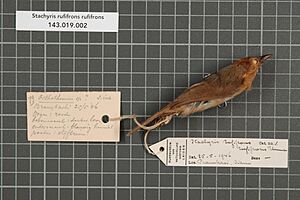Rufous-fronted babbler facts for kids
Quick facts for kids Rufous-fronted babbler |
|
|---|---|
 |
|
| From Mehao Wildlife Sanctuary, Arunachal Pradesh, India | |
| Conservation status | |
| Scientific classification | |
| Genus: |
Cyanoderma
|
| Species: |
rufifrons
|
| Synonyms | |
|
C. ambigua (Harington, 1914) |
|
The rufous-fronted babbler (Cyanoderma rufifrons) is a small, active bird that belongs to the Old World babbler family. These birds live in the forests of the Eastern Himalayan foothills and across Southeast Asia. You can find them at different heights, from about 120 meters (around 400 feet) up to 2,100 meters (nearly 7,000 feet) above sea level.
Contents
About the Rufous-Fronted Babbler
What Does It Look Like?
This little bird is mostly buff-brown. Its belly and chest are a lighter brown color. The top of its head, or crown, has a dull reddish-brown (rufous) color, which gives the bird its name. Its upper wings and tail are a whitish-grey. The area above its eyes (called the supercilium) and the space between its eyes and beak (called the lores) are also whitish-grey.
Size and Sound
The rufous-fronted babbler is quite small. It is about 12 centimeters (about 4.7 inches) long. It weighs only 9 to 12 grams, which is about as much as two quarters! You might hear its song, which is a high-pitched sound that goes tuh tuh-tuh-tuh-tuh-tuh.
How Scientists Name Birds
The Scientific Name
The scientific name for the rufous-fronted babbler is Cyanoderma rufifrons. Scientists use these special names so that everyone around the world knows exactly which animal they are talking about.
Who Discovered It?
A scientist named Allan Octavian Hume first described this bird in 1873. He found a small babbler in the Pegu Range in Myanmar. He noted that it was pale brown with a reddish-brown head and white lores. Over time, scientists have studied these birds more. They sometimes change how birds are grouped as they learn new things. The rufous-fronted babbler was later placed in the genus Stachyridopsis for a while, before its current name.


